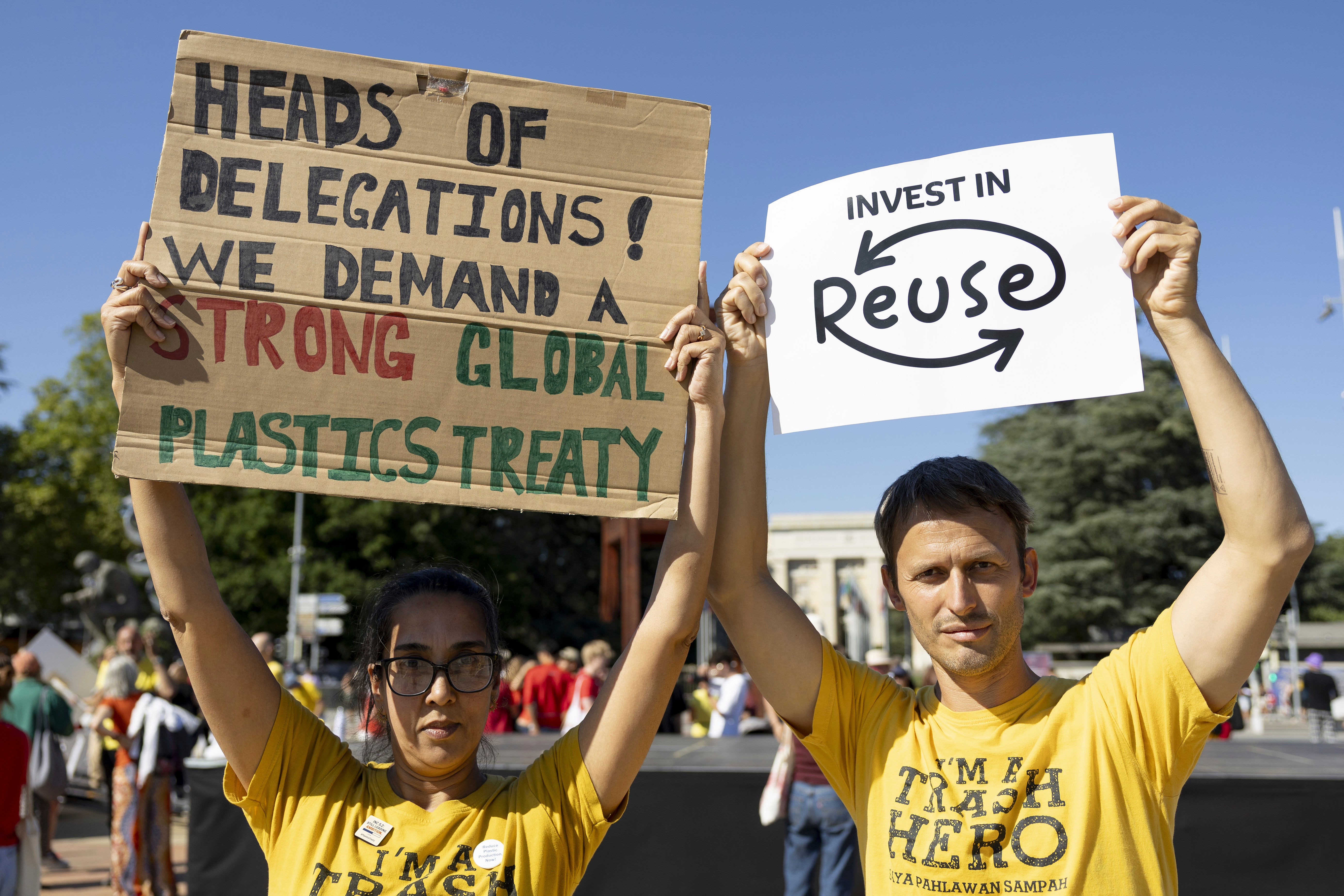At least 234 fossil fuel and petrochemical industry lobbyists have registered to attend the final round of plastics treaty negotiations in Geneva this week, the highest number ever, prompting new warnings that industry pressure could weaken the global effort to end plastic pollution.
According to an analysis by the Center for International Environmental Law (CIEL) and partners, lobbyists representing fossil fuel and petrochemical interests now outnumber the combined delegations of all 27 EU nations plus the EU itself.
Their presence also dwarfs Indigenous groups that are demanding stronger protections against vested interests and a binding treaty that cuts plastic production.
“This is the widespread fossil capture of multilateralism,” said Dylan Kava, strategic engagement and communications lead at the Pacific Islands Climate Action Network.
“The treaty meant to stop plastic pollution is being shaped by those who profit from it. These actors are weaponising participation to water down ambition and delay systemic change.”
Industry representation has surged over the past three negotiation rounds as delegates have come closer to the end of the process. According to data from CIEL, the third round of negotiations, also known as INC 3, saw 143 lobbyists, while the number surged to 196 at INC 4 and now to 234 at INC 5.2, with leading players like Dow, ExxonMobil and the American Chemistry Council registering multiple delegates each.
At the talks in Busan last year, known as INC 5, which were expected to be the final round, 220 lobbyists were present, CIEL said at the time.
The findings for the ongoing INC5.2 show that:
- At least 234 fossil fuel and chemical lobbyists are registered.
- At least 6 lobbyists are embedded in Egypt’s country delegation, four in Kazakhstan’s, three each in China’s and Iran’s, two in Chile’s, and one in the Dominican Republic’s
- Lobbyists outnumber scientific coalitions, with 60 representatives, and Indigenous representatives, with 36, by a margin of about 4:1 and 7:1, respectively.
“This is a crisis of credibility,” Mr Kava said. “You cannot solve a crisis by having the very cause of that crisis at the decision-making table.”

CIEL notes that these numbers may be an undercount since the methodology relies on self-disclosure of industry ties. Many lobbyists are also embedded in national delegations or attend via trade associations, think tanks or NGOs that obscure financial links to fossil fuel firms.
Rachel Radvany, environmental health campaigner at CIEL, said the industry was not just attending, it was actively shaping the outcome.
“On the first day of INC 5.2, we saw them boldly take the floor, speak in plenary, and push their agenda in plain sight,” she said. “They’re working in lockstep with petrostates to drag the process toward the lowest common denominator.”
The influence extends far beyond Geneva, campaigners warn.
Speakers pointed to the COP climate talks as a cautionary tale: 2,456 fossil fuel lobbyists attended COP28 in Dubai, outnumbering the 10 most climate-vulnerable nations combined. At COP29 in Baku, the number was still 1,773.
Brazil’s COP30 is already under scrutiny for hiring PR firm Edelman, which also represents Shell, and for its state oil company, Petrobras, planning to ramp up oil production by a third by 2030.
CIEL and its allies, including campaigners like Greenpeace, IPEN, GAIA, the International Indigenous Peoples’ Forum on Plastics, are urging the UN Environment Programme to adopt a robust conflict of interest policy, warning that failure to do so could lead to a treaty designed to protect polluters instead of people.
“There’s a fundamental, irreconcilable conflict of interest between the companies producing plastics and all of us who want to end plastic pollution,” said Ms Radvany.
“We need to prevent the plastics treaty negotiations from following the same failed path as the climate talks.”
Xananine Calvillo, co-founder of the Jna Tsjo Collective in Mexico, said Indigenous communities were being sidelined.
“We are already seeing the burdens of the crisis in our territories, in our lives, and in our bodies. These industries are buying decisions to continue with their interests and profit from the destruction of life.”
John Chweya, founder of Empower Grassroots Initiatives in Kenya, said it was “intentional” that those most harmed by plastic pollution were being excluded. “Most of the people who sit at the policymaking table are disconnected from what is happening on the ground and what we represent.”
Industry groups have defended their participation. “Our delegates are here to listen to governments,” Matthew Kastner, spokesperson for the International Council of Chemical Associations, said on Tuesday before the CIELs report was released, “and bring solutions that leverage innovations and the deep technical expertise our industries have that can help end plastic pollution.”
The council claimed it had 136 delegates in attendance and that it was “significantly outnumbered” by more than 1,500 NGO participants, a framing civil society groups rejected.
“The flood of fossil fuel and petrochemical lobbyists in Geneva is undermining the world’s best chance to end plastic pollution,” Graham Forbes, Greenpeace’s global campaign lead, said. “Polluters must not be allowed to write the rules.”
The final session of INC 5.2 is expected to determine the text of the global plastics treaty, setting the stage for its eventual adoption.
With talks now in their most sensitive phase, observers say the growing corporate presence threatens to derail ambitions, unless countries draw a red line on influence.
“We are not going anywhere,” said Delphine Lévi Alvarès, global petrochemicals campaign manager at CIEL.
“Civil society will be here every step of the way, encouraging governments to do what their communities deserve and need. Political courage must prevail over corporate capture.”


